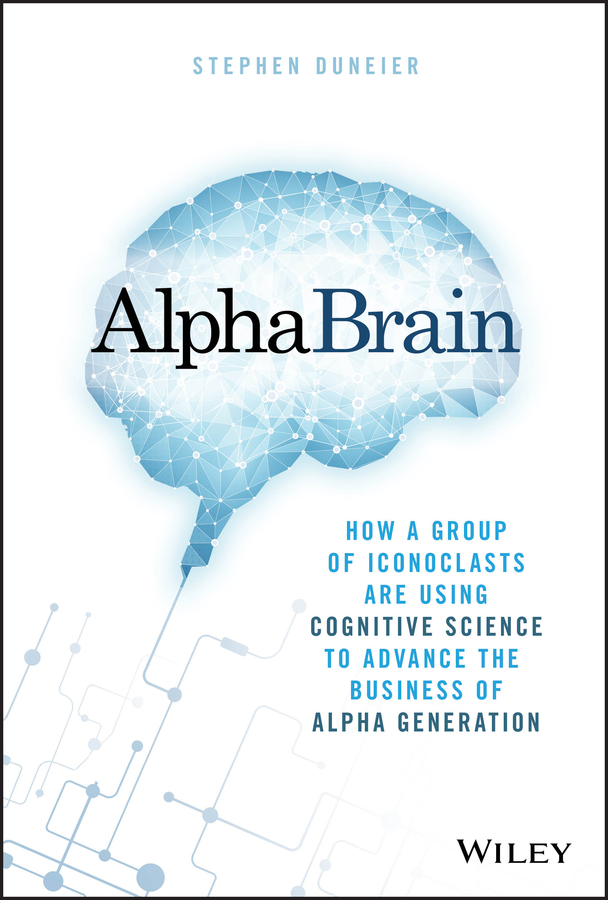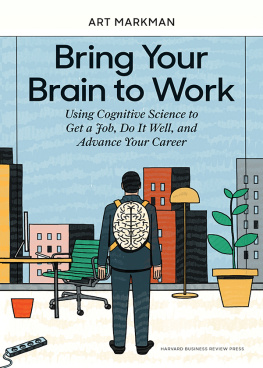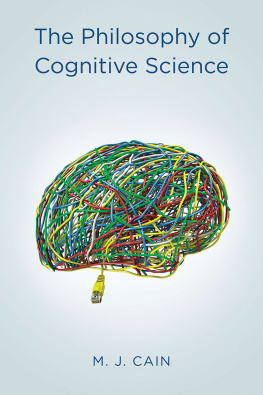
Table of Contents
List of Tables
- Chapter 1
- Chapter 9
- Chapter 12
- Chapter 14
- Chapter 16
List of Illustrations
- Chapter 1
- Chapter 2
- Chapter 3
- Chapter 5
- Chapter 6
- Chapter 8
- Chapter 10
- Chapter 12
- Chapter 14
- Chapter 15
- Chapter 16
- Chapter 17
Guide
Pages
AlphaBrain
How a Group of Iconoclasts Are Using Cognitive Science to Advance the Business of Alpha Generation
Stephen Duneier

Copyright 2019 by Stephen Duneier. All rights reserved.
Published by John Wiley & Sons, Inc., Hoboken, New Jersey.
Published simultaneously in Canada.
No part of this publication may be reproduced, stored in a retrieval system, or transmitted in any form or by any means, electronic, mechanical, photocopying, recording, scanning, or otherwise, except as permitted under Section 107 or 108 of the 1976 United States Copyright Act, without either the prior written permission of the Publisher, or authorization through payment of the appropriate percopy fee to the Copyright Clearance Center, Inc., 222 Rosewood Drive, Danvers, MA 01923, (978) 7508400, fax (978) 6468600, or on the Web at www.copyright.com. Requests to the Publisher for permission should be addressed to the Permissions Department, John Wiley & Sons, Inc., 111 River Street, Hoboken, NJ 07030, (201) 7486011, fax (201) 7486008, or online at www.wiley.com/go/permissions.
Limit of Liability/Disclaimer of Warranty: While the publisher and author have used their best efforts in preparing this book, they make no representations or warranties with respect to the accuracy or completeness of the contents of this book and specifically disclaim any implied warranties of merchantability or fitness for a particular purpose. No warranty may be created or extended by sales representatives or written sales materials. The advice and strategies contained herein may not be suitable for your situation. You should consult with a professional where appropriate. Neither the publisher nor author shall be liable for any loss of profit or any other commercial damages, including but not limited to special, incidental, consequential, or other damages.
For general information on our other products and services or for technical support, please contact our Customer Care Department within the United States at (800) 7622974, outside the United States at (317) 5723993, or fax (317) 5724002.
Wiley publishes in a variety of print and electronic formats and by printondemand. Some material included with standard print versions of this book may not be included in ebooks or in printondemand. If this book refers to media such as a CD or DVD that is not included in the version you purchased, you may download this material at http://booksupport.wiley.com. For more information about Wiley products, visit www.wiley.com.
Library of Congress CataloginginPublication Data is Available
ISBN 9781119335566 (Hardcover)
ISBN 9781119335924 (ePDF)
ISBN 9781119335917 (ePub)
Cover Design: Wiley
Cover Images: aleksandarvelasevic / DigitalVision Vectors / Getty Images; a-r-t-i-s- / DigitalVision Vectors / Getty Images
To my wife, Barbara, my daughter, Masie, and my son, Jackson, who will never stop helping me find my swing.
Preface
I began my career in finance in 1987 as a stockbroker at Drexel Burnham, back in the days of Michael Milken. I then traded exotic derivatives at Credit Suisse before there were standard pricing models. I ran currency option trading globally for Bank of America and emerging markets for AIG International. I spent 12 years as a global macro hedge fund portfolio manager, directly overseeing as much as $916 million in assets under management, and I founded and ran two hedge funds.
At about the same time I entered the industry, I began studying the cognitive sciences, particularly behavioral psychology and decision theory. So, as I was developing my own style, my own unique approach to investment and business management, I would apply everything I was learning about how the brain works, how we approach problems and make decisions to solve them.
As it turns out, when you do that, you wind up doing things very differently than most. But it wasn't just the approach that made me unique; it was the results it delivered that truly set me apart. For instance, in the first 12 months after I took over at Bank of America, we increased revenues by 70% without increasing costs at all. We did so on the back of a marginal adjustment to the way we made decisions as a group. In my first year running emerging markets for AIG International, we went from being the worst performing unit in the business to the best, as a result of a marginal adjustment to the way we approached problems. Over a 12year career as a global macro hedge fund manager, I generated 20.3% average annualized returns spanning quiet markets, highvolatility periods, and chaotic moments, with a Sortino ratio that was twice my Sharpe.
When I took the helm at one hedge fund, we were on the brink of failure. We had let go all nonessential personnel, cut salaries to the bone, and hadn't raised a penny in assets since launch nor made a penny for our investors. Over the next 13 months, we increased assets under management 12fold, from $100 million to $1.25 billion, beat our benchmark index by 2500 basis points net of fees, and every single portfolio manager had his career best year all because of a few marginal adjustments to our decisionmaking process.
As happy as I have been with the results, anyone who has studied decisionmaking knows that what I've just listed are outcomes. We don't control outcomes. What we do control are all the tiny little decisions that we make along the way. Decisions that must be made rationally in order to improve the odds of achieving the outcomes we desire.
The majority of books on the subject of cognitive science focus on presenting evidence of our flaws. I don't want to discount the value of that evidence. It is essential material, for unless we accept that we are all susceptible to bias and other shortcomings that unconsciously lead to systematic errors in judgment, it is nearly impossible to overcome it. If you can't overcome it, you are as good as you will ever be.
AlphaBrain differs from the other books in that it applies these abstract, seemingly academic concepts to the industry of institutional investment management, but takes it one step further. Rather than simply make readers aware of our flaws, we will explore actual solutions to real world problems. Instead of reading yet another book on cognitive bias, then setting it down and going about your business in exactly the same way as you had been, you should expect to set the book down numerous times in order to contemplate your own actions as an institutional investor, and begin implementing real change. In order for that to happen, for you to experience a leap forward in the evolution of your decisionmaking, I must first convince you that you are as vulnerable to those mistakes as every other human being. The fact that you are likely very intelligent, well educated, experienced, and perhaps successful already, it makes my job that much more difficult.
I know from experience how difficult it is to read the works of Kahneman, Ariely, and Tversky, and see yourself as their flawed subjects, but until you do, the odds of you actually learning from it and experiencing that leap forward are drastically reduced. Let me share with you how I made the leap.
Next page






